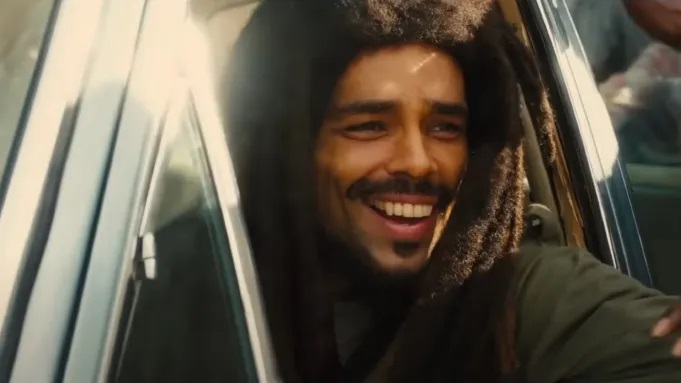Bob Marley: One Love (Green, 2024)
Few critical cliches make me grind my teeth more than “I wanted to like it,” but I don’t know where else to go in a review for this film.
Bob Marley is an accomplished artist and interesting person about whom the film offers no real insight. I think that perhaps those who already know Marley’s life details might be better equipped to enjoy the film, but I doubt that is the film’s intended market strategy.
When One Love opens, Marley is already an adult and already Jamaica’s biggest star. I thought perhaps the film would focus on a single chapter of his life, as Lincoln does with its protagonist or Amistad does with John Quincy Adams. That certainly appears to be the intention when the opening titles announce that Marley is preparing to do a free concert to unite his politically divided country. But that concert happens relatively quickly and then we are off to Europe.
Two scenes exemplify the meandering nature of the screenplay. Bob follows his wife, Rita, out of a club and the two have one of those intense arguments that vent long-simmering tensions that a better movie would have shown us building. She references his adulterous relationships and illegitimate children. He accuses her (I think) of having a lover. She speaks of other opportunities to have a career on her own that she has turned down. All of it feels like exposition after the fact. In another scene, Bob violently erupts at his business manager for…something to do with a proposed tour of Africa? That scene, at least has a predecessor where members of the band note the manager talking to….someone….about….something. That the Africa tour is important to Bob is evidenced. Why it is so isn’t really clear, nor is what the manager did.
Marley is seen reading a book with Haile Selassie on the cover and later he receives a ring from Selassie’s son, but who Selassie is and why he is important to Marley isn’t really explained for anyone who doesn’t already know. In one scene, the characters discuss the belief that Jesus wasn’t really white, but how this related to Marley’s Rastifarianism is also not explained. It’s not a biopic’s job to be a history lesson, but absent any sort of historical context, it is difficult to tell which elements of the protagonist’s life are significant and which are just easter eggs for sharp-eyed viewers in the know. For example, when Marley is diagnosed with a rare form of cancer, his ambivalence about getting it treated is meant to convey…what exactly? That the music tour is more important? That his life isn’t? That he thinks he’ll be fine without treatment?
Nowhere is the film’s holding its broader audience at arm’s length more evident than in the way it leans heavily into the Jamaican accents of its characters. At least three different viewers at the test screening that I was at reported that they wished the film had provided subtitles. I can understand how doing so might alienate Marley’s fanbase, especially given the introduction from one of his family saying they had been consulted for authenticity’s sake. But if the movie truly believed Marley’s message extended beyond the music, it is a shame that so much of the message was indecipherable even to those trying to hear with ears and hearts wide open.

